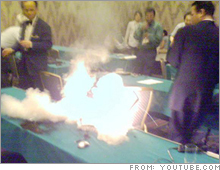The next big thing in batteriesExploding batteries light fire for alternatives, but don't expect to see them in laptops anytime soon.NEW YORK (CNNMoney.com) -- In the labs of major computer makers, academic institutions and start-ups, researchers are searching for the next big thing in laptop batteries. From PC makers Hewlett-Packard (Charts) and Toshiba to Silicon Valley start-up Zinc Matrix Power, researchers are developing alternatives to the lithium ion batteries prevalent in today's laptops.
While many of these technologies have long been in the making, they're getting pushed into the spotlight due to the ongoing flap over lithium-ion batteries. "The chances of alternative batteries gaining a foothold is much higher than a year ago before the issue with lithium ion batteries became mainstream," said Carmi Levy, an analyst with Info-Tech Research Group. Nearly all of the major computer makers, including Dell (Charts) and Apple (Charts), are recalling up to 9.6 million lithium-ion notebook batteries manufactured by Sony (Charts) due to concerns they may overheat and cause a fire (see correction below). Most recently, Fujitsu said last week that one of its laptops overheated and burned a user's hand. One firm hoping to benefit from the safety issues raised by the recalls is Zinc Matrix Power. The company makes silver-zinc batteries that don't contain lithium or other flammable liquids, so they can't explode, CEO Ross Dueber said. "Consumer electronics are bursting into flames. Is that really acceptable in terms of safety and brand awareness for device manufacturers?" he said. It isn't just safety concerns driving interest in alternatives. The consumer electronics industry has long been searching for a battery that can run longer on a single charge. Toshiba - which also has recalled Sony-made lithium-ion batteries -has developed a prototype for a fuel cell laptop battery that generates power from a chemical reaction rather than being plugged into an electric outlet. The prototype can run 8.5 hours and the company aims to have a working commercial product ready in 2008 or 2009, Toshiba product manager Duke Dang said. While real demand for technology like fuel cells hasn't really kicked in yet, the recent fires show that people are pushing lithium ion to the limits, said Al Pan, a scientist with HP Labs, the research arm of the Silicon Valley computer maker, which also is working on fuel cell technology. Industry experts said consumers aren't likely to find new types of batteries in laptops in the market for at least a few more years. For one, lithium ion batteries are relatively inexpensive, and any new technology faces the task of producing at a price consumers have come to expect, analysts said. Donald Sadoway, a professor of materials science at the Massachusetts Institute of Technology, said it's often the case that new technology isn't greeted with open arms. He's been researching lithium polymer batteries, which hold lithium in a solid state rather than liquid form, which makes them more stable and capable of withstanding more heat. But consumers are more likely to see changes to existing lithium-ion technology before battery makers and computer makers make the leap to a completely new type of technology, Sadoway said. Also, consumers are taking a "if it isn't broke, don't fix it" attitude and aren't really demanding alternatives, said Rob Enderle of technology consulting firm the Enderle Group. While the number of batteries recalled has been staggering, the actual instances of fire has been rare. Dell recalled some 4.2 million batteries, but received only six instances of overheating. Sony insists it's rare for a lithium ion battery to catch fire and has said it's introduced manufacturing safeguards to improve the safety of its batteries. So far, the largest computer makers don't look to be shifting away from lithium ion. Dell said it's always evaluating new technologies but doesn't plan to move away from lithium ion batteries in its laptops. And John Wozniak of HP Notebook Engineering said there aren't any real commercially viable alternatives out there yet. "Lithium ion is here to stay." Correction: An earlier version of this story incorrected stated that HP is participating in the battery recall. CNNMoney.com regrets the error. |
Sponsors
|

